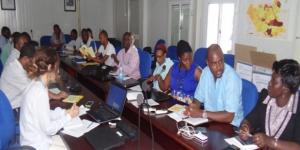New Kit for the treatment of Severe Acute Malnutrition launched by WHO in South Sudan
6 June 2016 - WHO launched the first ever drug module kit for the management of Severe Acute Malnutrition and Medical Complications in children. South Sudan is the first country in the world to introduce the use of the kit. The kit constitutes the most essential and basic medicine for the treatment of children with severe acute malnutrition and medical conditions. The kits comprise four basic modules of routine, basic, supplementary and malaria drugs.
The kit is a key strategy to support stabilization centers to manage Severe Acute Malnutrition (SAM) or Malnourish Children (MC), strengthening capacity to deliver effective and immediate nutrition and health response according to Dr Allan Mpairwe, program coordinator of Outbreak and Disaster Management of WHO South Sudan’s program. It will enable MoH and partners operating the stabilization centers (SC) to be autonomous in providing a comprehensive treatment for inpatients. Additionally, the kits will provide a stop gap measure for hospital stock of medicines, which currently are not specifically procured and managed for malnourished children.
The advantage of WHO kit for SAM consists in streamlining the procurement of a standard set of drugs; it represents an innovative modality to support SC, in terms of harmonization, fast track procurement, quick deployment in emergency says Marina Adrianopoli, nutrition coordinator for WHO. The kit will provide relief and avert potential complications and death in over 1000 children in the first three months and additional 3000 children in few months, by increased coverage. WHO will be supporting one third of the stabilization centers across South Sudan.
Moreover during the launch ceremony, the director of Nutrition at the Ministry of Health South Sudan, Mrs Rebecca Alum William thanked WHO for the support and appreciated the rigorous and robust process of developing the kit. “WHO has never cease support to the Ministry of Health, they are our true partner” says Mrs William. She later referenced on the numerous contribution of WHO to the Nutrition program ranging from policies development to national guidelines for in-patient management of Severe Acute Malnutrition, including the training package. She also admonishes partners to meticulously manage the kits and use it only for the intended purpose and patients.
The nutrition situation in South Sudan remains precarious, with an estimated 686,300 children under-age of 5 are acutely malnourished including more than 231 300 children expected to be severely malnourished, in 2016. The Greater Upper Nile and areas with perennial high rates, including Warrap and Northern Bahr el Ghazal, continue to have the highest malnutrition burden and the situation is likely to remain critical in over two third of the counties in Greater Upper Nile, NBeG, Warrap and parts of Eastern Equatorial.
Severely malnourished children with medical conditions are those at highest risk of death and do not respond to medical treatments as their well-nourished counterparts do. Children with severe acute malnutrition who have medical complication should be treated in stabilization centers (SC), where inpatient medical and nutrition care is provided. Availability of core drugs will be a decisive condition for the sustainability of life saving nutrition services in the most affected areas.
__________________________________
For more information, please contact:
Dr Allan Mpairwe - +211955372370; mpairwea [at] who.int (mpairwea[at]who[dot]int)
Ms Marina Adrianopoli - +211954918382; adrianopolim [at] who.int (adrianopolim[at]who[dot]int)
Mr Morris Gargar - +211927296042; gargarm [at] who.int (gargarm[at]who[dot]int)



